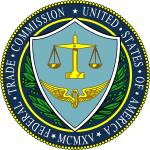United States Federal Trade Commission

Seal of the Federal Trade Commission
|
|

Flag of the Federal Trade Commission
|
|
| Agency overview | |
|---|---|
| Formed | September 26, 1914 |
| Preceding agency |
|
| Jurisdiction | United States |
| Headquarters | Washington, D.C. |
| Employees | 1,131 (December 2011) |
| Agency executive |
|
| Website | www.ftc.gov |
| Footnotes | |
| Competition law |
|---|
| Basic concepts |
| Anti-competitive practices |
| Enforcement authorities and organizations |
The Federal Trade Commission (FTC) is an independent agency of the United States government, established in 1914 by the Federal Trade Commission Act. Its principal mission is the promotion of consumer protection and the elimination and prevention of anticompetitive business practices, such as coercive monopoly. The Federal Trade Commission Act was one of President Woodrow Wilson's major acts against trusts. Trusts and trust-busting were significant political concerns during the Progressive Era. Since its inception, the FTC has enforced the provisions of the Clayton Act, a key antitrust statute, as well as the provisions of the FTC Act, 15 U.S.C. § 41 et seq. Over time, the FTC has been delegated with the enforcement of additional business regulation statutes and has promulgated a number of regulations (codified in Title 16 of the Code of Federal Regulations).
Following the Supreme Court decisions against Standard Oil and American Tobacco in May 1911, the first version of a bill to establish a commission to regulate interstate trade was introduced on January 25, 1912, by Oklahoma congressman Dick Thompson Morgan. He would make the first speech on the House floor advocating its creation on February 21, 1912. Though the initial bill did not pass, the questions of trusts and antitrust dominated the 1912 election. Most political party platforms in 1912 endorsed the establishment of a federal trade commission with its regulatory powers placed in the hands of an administrative board, as an alternative to functions previously and necessarily exercised so slowly through the courts.
...
Wikipedia

